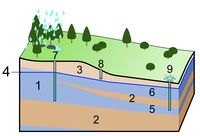
Photo from wikipedia
The study aimed at assessing the groundwater quality and the associated health implications of oil storage tank farms in Asaba, Oghara, Warri, and Koko towns, in Delta State, Nigeria. Fe,… Click to show full abstract
The study aimed at assessing the groundwater quality and the associated health implications of oil storage tank farms in Asaba, Oghara, Warri, and Koko towns, in Delta State, Nigeria. Fe, Cr, Cd, Ni, Pb, and V concentrations in the groundwater samples were determined using Atomic Absorption Spectrophotometry (AAS), while total hydrocarbons (THC) concentrations were determined using gas chromatography coupled with a flame ionization detector (GC-FID). The quality index of Warri groundwater was 66.38; being within the range of 51–75 was considered poor quality. The water quality indices (WQI) of Oghara, Koko, and Asaba were 163.79, 161.43, and 129.95 respectively, which were all > 100, hence amounting to very poor water quality status. Results indicated that children in Oghara who are orally exposed to chromium are at risk of cancer. Both adults and children orally exposed to THC in Oghara are also at risk of cancer. Furthermore, THC posed an oral route cancer risk to the children in Koko town. The study showed that chromium posed carcinogenic threats to children in Oghara, while THC posed carcinogenic threats to adults and children in Oghara and children alone in Koko. These risks are liable to be mediated through ingestion of the groundwater of Oghara and Koko by the susceptible groups.
Journal Title: Toxicology Reports
Year Published: 2022
Link to full text (if available)
Share on Social Media: Sign Up to like & get
recommendations!